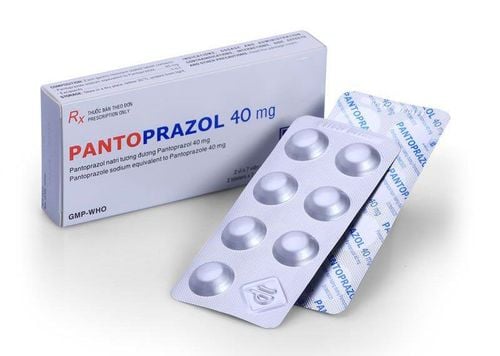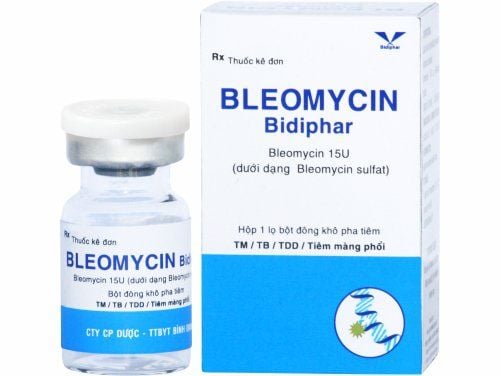This is an automatically translated article.
Tumor lysis syndrome is a dangerous complication in cancer treatment. Although very rare, but if it is not diagnosed and treated early, it can be life-threatening. The best treatment is to perform risk prevention before and during chemotherapy.1. Overview of u lysis syndrome
Tumor lysis syndrome is a group of metabolic disorders secondary to tumor destruction and release of intracellular products into the systemic circulation.Tumor lysis syndrome is an emergency that can occur in the early stages of cancer treatment, but is relatively uncommon. If not detected and treated early, it can lead to irreversible organ damage or even death.
Characteristic of tumor lysis syndrome is that cancer cells die and burst, causing the release of potassium, phosphorus and nucleic acids into the blood. When high concentrations of these substances in the blood cause metabolic changes that cause lactic acidosis, high phosphorus levels inhibit the reduction of calcium in the blood, increasing the concentration of acid in the urine can promote the formation of calcium. uric acid in the urinary tract and subsequently kidney failure.
2. How is tumor lysis syndrome treated?
The treatment of imbalance caused by tumor lysis syndrome should be done quickly. Avoid complications due to metabolic disorders that endanger the patient's life.Treatment of tumor lysis syndrome by the following methods:
Intravenous fluid replacement Intravenous fluids are usually started at diagnosis and continued throughout chemotherapy. Fluid replacement is important to prevent blood imbalances and aid in improving kidney function, preventing progression to kidney failure.
Some patients may need diuretics to help with urination. Monitoring urine output during treatment is essential.
Drugs that lower uric acid High levels of uric acid in the blood are a feature of tumor lysis syndrome. Drugs used to treat high blood uric acid include allopurinol and rasburicase:
. Allopurino l : Helps prevent uric acid formation. Cancer patients usually take allopurinol 2-3 days before starting chemotherapy and continue taking it for 10 to 14 days. Allopurinol is mainly used as a prophylactic for hyperuricemia.
. Rasburicase: Mechanism of action by breaking down and lowering uric acid in the blood. The drug is rapidly acting, usually working to lower serum uric acid within 4 hours. Rasburicase can be used to prevent or treat high uric acid. However, patients with G6PD deficiency should not take this medicine.
Drugs that reduce Phosphate High phosphate is also a feature of tumor lysis syndrome, drug use can be used to lower blood phosphate levels. These drugs, called phosphate binders, attach to phosphate to prevent it from being absorbed in the digestive system. Does not cause hyperphosphatemia.
Examples of these drugs include: Lanthanum carbonate and aluminum hydroxide drugs
Treatment of electrolyte imbalances Metabolic imbalances including high potassium, high phosphate, and low calcium levels can often be treated by Support kidney function and maintain adequate fluid intake through perfusion.
Hemodialysis Kidney damage is a common complication of tumor lysis syndrome caused by increased uric acid in the blood. Treatment, prophylaxis with intravenous fluids and drugs to reduce uric acid levels are used, but even with adequate medical care, the correct use of drugs can still cause deterioration of kidney function and more severe progression.
In this case, the patient needs to undergo dialysis. For most patients, kidney function will improve slowly over time. However, some patients may experience persistent kidney damage following tumor lysis syndrome, even with prior therapeutic or prophylactic measures.

Biến chứng thường gặp của hội chứng ly giải u là tổn thương thận
3. Monitoring the treatment of tumor lysis syndrome
During the treatment of tumor lysis syndrome, it is necessary to monitor for specific signs of tumor lysis syndrome, which should include:Evaluation of symptoms such as urine output, heart rate, digestive disturbances.. It is very important to measure the 24-hour urine output. Early detection of risk of impaired kidney function Tests to check levels of potassium, phosphate, calcium, uric acid, blood urea, creatinine, and lactate dehydrogenase (LDH). The length of follow-up will depend on whether the patient is considered high, moderate or low risk. Good control of people at high risk for tumor lysis syndrome and risk prevention at each level is the best measure to limit complications caused by this syndrome.
With a team of highly skilled doctors who have achieved many achievements in the treatment of cancer diseases, Vinmec International General Hospital is now the address for high-quality medical care that customers completely trust. can trust.
The examination and treatment process at Vinmec is carried out according to certain standards with the support of doctors, experts and a system of modern equipment and machinery in the world. Therefore, helping to bring accurate diagnosis results as well as extremely positive treatment effects on patients.
Please dial HOTLINE for more information or register for an appointment HERE. Download MyVinmec app to make appointments faster and to manage your bookings easily.













